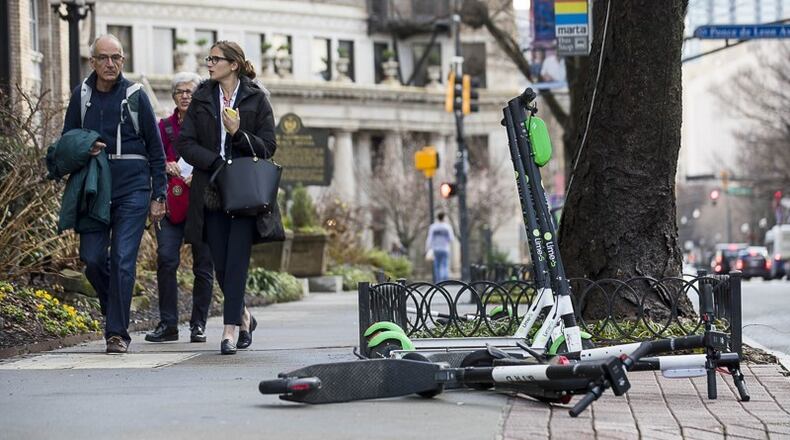The city of Atlanta is no longer releasing rentable, e-scooters back to the companies that own them without receiving impoundment fees after the devices have been picked up for being parked improperly.
The order from Public Works Commissioner James A. Jackson Jr. comes after it was revealed last month that the city failed to collect at least $200,000 in scooter impoundment fees since summer.
Jackson said during a presentation to a council committee last week that his order has been in effect since Nov. 12.
But scooter companies say the city has provided inconsistent evidence the impounded devices were illegally parked. In some cases, companies said they’d received documentation intended for their competitors.
“This has been an ongoing process working with the city to get notifications of improperly parked scooters,” a Bird spokesperson told the AJC. “The city only recently released information relating to some of the impounds. Our internal teams are currently reviewing for accuracy.”
The city did not make Jackson available for an interview to respond to questions from the AJC for this story.
The latest kerfuffle between the city and scooter companies raises questions about the Public Works’ process for collecting the scooters and informing companies of violations. Council members questioned Jackson last week about Public Works’ process in documenting illegally parked scooters, and raised concerns that companies received incorrect violations.
Jackson admitted the city had initial issues with enforcement because the team tasked with collecting scooters — the Solid Waste Education Enforcement Team — is also responsible for enforcing sanitation regulations such as illegal dumping, recycling, and solid waste disposal.
Jackson told the transportation committee that the team confiscates the devices whenever they see them illegally parked.
In response to a question from Councilman Matt Westmoreland, Jackson said his team has taken photos of confiscated scooters “for the last couple of weeks.”
Violations are also reported to the city’s 311 system, which notifies the companies and Public Works when the scooters are improperly parked.
Jackson said the city has made more than 3,000 calls asking companies to pick up their devices within two hours to avoid impoundment. Other cities also allow two hours for companies to collect improperly parked scooters before impounding them, spokespersons for three scooter companies have told the AJC.
Jackson said in many cases the companies operating in Atlanta retrieve the scooters in that two-hour window.
“But when our personnel encounters them, we simply don’t have the luxury of calling in (and) then having to go back to check to see that (scooter companies) actually did what it was that they needed to do,” Jackson said. “So we (impound) the devices on-site.”
Councilman Amir Farokhi said he’s received emails that Public Works sent to the wrong company about impounded scooters. He said the city needs to make sure the impoundment process is set up in a way that is legally sound and enforces the rules the city has in place.
“I think it’s a reasonable expectation, whether you’re getting a speeding ticket as a driver or you have a scooter that runs afoul of city law, that the violation is documented and that proof is provided to the vendor in order to ask for a payment,” Farokhi told the AJC.
Representatives with Bird, Lime and Uber JUMP scooters said they first received invoices for impounded scooters in May, but those were for February and March impoundments.
The city also didn’t notify scooter operators of the recent changes before making them, according to a Bird spokesperson.
“Consequently, our drivers were suddenly turned away and were told to call the Department of Public Works for an explanation,” the spokesperson said.
Andre Dickens, transportation committee chair, said scooter companies need to be held accountable, but asked that Public Works provide a flow chart that clearly shows each step of the impound process from start to finish.
“It needs to be on paper in a format that everyone can understand,” he said. “The public wants us to clean up any kind of scooter litter, so this is a way to do that. But scooter riders also don’t want to pay higher costs to ride a scooter because more are being impounded than necessary or that the cost is exorbitant.
“So, we’re trying to find a balance on that.”
Public Works, along with the Department of City Planning, are still in the process of revamping scooter legislation to present to council members. The city has already issued an online survey asking for residents’ input on scooters.
The departments will present an updated plan to the transportation committee on Dec. 11.
Like Intown Atlanta News Now on Facebook | Follow us on Twitter
In other news:
About the Author
Keep Reading
The Latest
Featured



